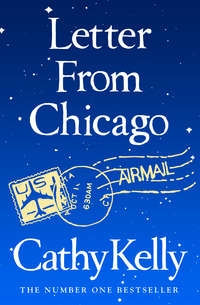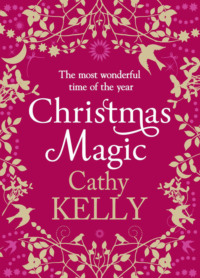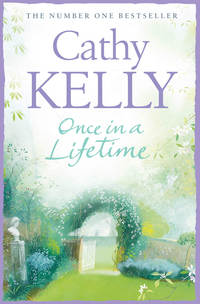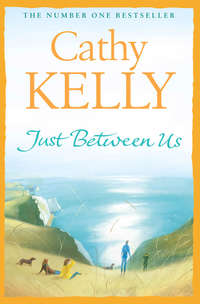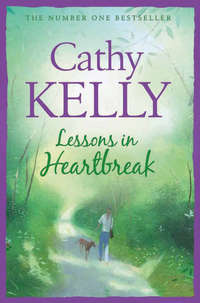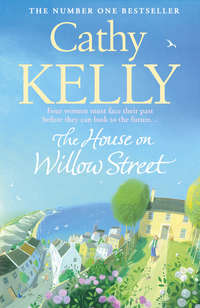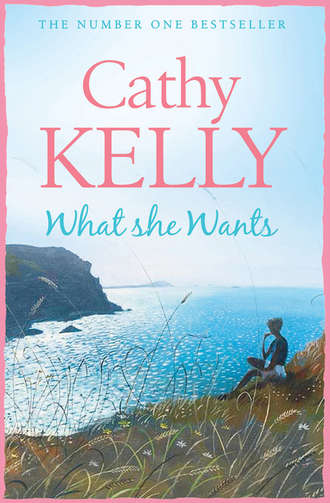
Полная версия
What She Wants
‘Hope, meet Finula Headley-Ryan, the leading light of the artistic community in Redlion and the lady who’s been so kind about getting me into the writers’ centre at short notice.’
‘Tsk, tsk,’ said Finula, clearly delighted with this description but pretending she wasn’t. ‘I’m only an old dauber, hardly an artist at all.’
She sailed over to Hope and held out a freckled hand, weighed down with elaborate old gold rings. The glamorous effect was slightly ruined by chipped scarlet nail varnish that revealed yellowing nails underneath.
‘I’m sure you’re not so pleased to meet anyone when this house is like the wreck of the Hesperus,’ she said in that low, thrilling voice. ‘Matt, you are a melt for not telling the poor girl that the place isn’t habitable. Think of the shock she got when she thought this was her new home in all its freezing glory. What are you like?’
‘Well, I wanted Hope to come and I knew she’d hardly be keen if I told her what was left to do,’ he said, giving Finula the benefit of his handsomest smile. ‘Anyway, Hope,’ he added, slightly wheedling, ‘I’ll get the workmen to start on Monday.’
‘Obviously, the children can’t stay here,’ Hope said, her shock at the state of her new home overcoming her dislike of getting personal in front of strangers. ‘We’ll have to stay in a hotel.’
‘Nonsense,’ Finula declared. ‘You’ll stay with me. The only hotel round here is five-star and would cost a bomb. We’d love to have you. A couple of days and we’ll have this house spick and span. It’s not at all fit for children.’ She leaned over and rubbed Millie’s cheek.
Instead of scowling the way she usually did when someone she didn’t know touched her, Millie dimpled up at Finula.
‘Little dote, isn’t she?’ sighed Finula. ‘My Cormac is twelve now, too big for cuddles but they’re lovely at that age.’
Thinking of Millie’s waking-the-dead tantrums on the journey from the airport, Hope managed a weak smile and said yes, lovely.
‘Now, follow me,’ Finula ordered.
Within minutes, she’d bundled Hope and the children into her car, a battered green station wagon that had been side-swiped so often there were only stripes of green paint on the doors.
‘Matt can take your car,’ Finula said, crunching gears as she drove over a few bushes doing a five-point turn. ‘My house is down an awful pot-holed bothreen and you’d be tortured following me.’
The inside of the car was as messy as the outside, with a filthy pair of Wellington boots on the back seat and several smelly waterproof coats, exuding a scent of mud and wet dog, crumpled up on the floor.
Hope sat in silence as they drove at high speed along a narrow road. She was suddenly exhausted after her journey and so angry with Matt for expecting her to live in such squalor that she was incapable of making polite conversation. Finula, however, kept up a stream of talk that, luckily, required no response.
‘There are seventeen of us in the community who live here full time. Mainly artists but we’ve got three novelists and two poets. I’m sure you’ve heard of Maire Nic Chinneide.’
Before Hope had time to nod dishonestly at this, Finula was off again.
‘Amazing poet, so lyrical. Her poems about the traffic on the Killarney Road would bring a tear to your eye. Anyway, as I was saying, as well as the full timers who live in the area, at least two hundred artists and writers come during the year, and we have a wonderful time. I’ve been here ten years and I feel like part of the furniture. Myself and Ciaran – Ciaran’s a novelist by the way – came from Dublin originally. I wouldn’t go back for all the tea in China. There are no twenty-four-hour shops here or high rise buildings: it’s heaven.’
Hope, longing for a twenty-four-hour shop and a couple of high rise buildings, said nothing.
Finula described the entire artistic community, how often they met in the Creativity Centre (every day, as far as Hope could make out) and what sort of wonderful entertainment was available (weekly dinners during the high season and two creativity workshops during the year when the place sounded as if it was over-run with would-be writers and painters.) Matt had explained all this to Hope previously but when he’d said how it worked, it hadn’t sounded like some demented religious commune. Feeling more and more anxious, Hope wondered if there were other women with small children.
‘The locals don’t bother with us much, they think we’re all mad artistic types,’ Finula tittered.
Hope privately thought that Finula relished being a mad artistic type. Compared to Finula’s flamboyant floral rig out, Hope felt like a mouse in her serviceable navy chinos, navy wool polo neck and beige casual jacket. Would she have to start wearing loads of mascara, plenty of shawls and her Liberty nightie to fit in?
‘I’m sure Matt has told you all about us,’ Finula said, swerving rapidly as she made a right hand turn into a beautifully-kept driveway.
‘Not really,’ Hope hedged, vowing never to get in a car with Finula ever again.
They pulled up outside a big homely farmhouse set amid a forest of pine trees. Unlike the cottage, this was beautifully maintained, with big planters full of dwarf conifers in a regimented line beside the porch and ornamental wagon wheels set along a veranda. A swing seat took pride of place on the left of the veranda, complete with stripy canopy. The entire premises would not have looked out of place in a Doris Day movie.
‘Let’s get you all in and get some food into the little ones,’ Finula bossed.
Finula’s home was everything Hope wanted in a rural retreat. Rambling yet cosy, with plenty of squashy sofas, Turkish rugs on the stone floors and lots of pictures, ornaments and books to enliven the place. Her kitchen was the sort of place that highly successful television cooks always seemed to have: a triumph of golden wood complete with an Aga, butcher’s block and bulbous copper saucepans hanging from the ceiling. Hope had always wanted one of those saucepan-hanging things.
‘I know it’s a shock when you up sticks and move to the country for the first time,’ Finula said when Hope and the children were installed at the huge wooden kitchen table, the children with home-made yoghurts and home-made apple juice, Hope with a big glass of red wine – thankfully not home made.
‘But it’s so good for the children. You can have a chance to bring them up the right way here, to teach them about life and nature, to feed them natural, organic foods and to be with them all the time. It’s a quality of life you can’t get in the big city. No rapists, murderers or burglars.’
Hope took a slug of wine and mused on how the locals had managed to keep murderers, rapists and burglars out: with an electric fence, perhaps?
‘Of course, personally, I think those degenerate hippie people up the road aren’t to be trusted,’ Finula added nastily, ‘but we’ve had no trouble with them yet. Matt’s been telling me how you’ve longed to spend time with the children, that you were tired of the rat race.’
Hope wished Matt hadn’t been quite so free with his confidences. Finula already seemed to know everything about her. She idly wondered if he’d mentioned her premenstrual tension or that time he’d had shingles and been off sex for a month, just to give a rounded psychological picture of them as a couple.
‘Wait till you’ve had the thrill of growing your own vegetables,’ Finula sighed.
Now did not seem like the time to mention that Hope only liked her vegetables fresh from the supermarket counter and that the last thing she’d grown was a peace lily given to her when Toby was born. It was long since on a tip somewhere, withered because she’d forgotten to water it.
‘And hens, you’d love hens,’ Finula said. ‘Old Gearóid had a lovely hen house out the back and you’d be mad not to get hens. Think of it,’ Finula’s eyes went misty, ‘your own free range eggs. You have to watch the foxes, mind,’ she added, waving a finger to illustrate how dangerous foxes were. ‘Matt really needs a gun, you know. For the foxes, although I doubt if he’d get a licence for one.’
‘I can’t imagine Matt shooting anything,’ Hope ventured.
‘Well, he’s great at fishing so I assumed he could shoot as well.’
Hope stared at her. ‘Fishing? I didn’t know he could fish.’
‘There’s no point hiding your light under a bushel here!’ Finula wagged a finger. ‘He’s wonderful fisherman. He didn’t let on at first, but we soon got it out of him. There are no secrets in Redlion. I’m sure you’re very into organic food as well. I wouldn’t dream of having anything else in the house. And as for convenience foods, tsk!’ Finula’s snort indicated what she thought of convenience food. ‘Shop bought meals and tins of food, they rot your insides, believe me.’
It occurred to Hope that she’d have to visit the village shop under cover of darkness if she was to purchase things like fish fingers, Lean Cuisines and the tinned spaghetti the kids adored. Then again, maybe the village shop didn’t have things like fish fingers or tinned spaghetti. Maybe it only sold tofu, yak’s milk and bean sprouts. And not a single packet of crisps and Hula Hoops. Suddenly, she yearned for a delicious packet of Hula Hoops, full of non-organic preservatives and things Finula would disapprove of. Gorgeous.
Finula was still talking. Did she ever shut up? ‘Cormac has done so well since he came here. We spend quality time together. You don’t get that when you work outside the home,’ she said beadily.
Hope wanted to stand up for working outside the home. Millions of women have to work, they have no choice, she wanted to say. And many more want to work, they want a career. That doesn’t mean their children suffer. But she said nothing. Matt had obviously painted her as an earth mother who couldn’t wait to give up her job, so there was no point. She hardly knew this woman after all and they were her guests. So Hope smiled her polite smile and wished she was at home in her own kitchen in Bath, doing the ironing. Yes, that would be a suitable swap. A mound of ironing as big as a house would make up for being in this mad woman’s kitchen feeling her life spiralling out of control.
At that moment, Matt arrived and to Hope’s utter surprise, started to make himself a cup of tea, seemingly completely at home in Finula’s kitchen. ‘Ciaran and I put the cases in the two back bedrooms,’ he said. ‘Finula’s been putting me up since I got here. Isn’t she wonderful?’ he said to Hope, patting her arm affectionately.
‘Yes,’ said Hope, tight-lipped.
Tired from their journey, Toby and Millie miraculously went to bed without a fuss. Hope would have loved to have thrown herself onto the double bed in her and Matt’s room and joined them in the land of Nod, but she knew she had to have dinner with the others.
Ciaran, who turned out to be a short, bald and spectacled man looking a million miles away from his description as an arty type who wrote historical novels, was making his special beef in Guinness, the family’s favourite recipe.
‘You’ll adore it,’ said Finula throatily to Hope. ‘Oh my dear, do meet my lovely little Cormac.’
Cormac was a big, sullen lad who was anything but lovely. He wolfed down his meal almost before the rest of them had picked up their forks and immediately shoved his seat back from the table and left.
‘Homework,’ said Ciaran.
Bad manners thought Hope.
It was a strange evening. Over dinner, Hope watched her husband laugh, joke and tell stories about the advertising rat race and how he was glad to be out of it. There was no trace of the focussed, ambitious ad man who lived and breathed for his job and who read the advertising magazine, Campaign, as if it were the Bible.
She also watched Finula gaze raptly at the handsome happy face like a dog drooling for a marrow bone. Matt seemed utterly unaware of Finula’s admiration.
‘I love this place,’ he said, squeezing Hope’s hand. ‘It makes me feel alive.’
Hope squeezed back. It was wonderful to see Matt happy again and to feel that there was new life in the marriage. It was only for a year after all.
The local people were, according to Ciaran and Finula, all very boring. Having overheard herself being described as boring more than once, Hope felt a glimmer of pity for the locals.
‘I have tried, believe me,’ Finula said querulously after her sixth glass of wine. ‘I’ve tried to get them involved in the community. We had that Thai evening in June and invited everyone to come. I even got a Tai Chi teacher to come in for a demonstration, I thought it would be lovely to start local classes. But no.’ She sniffed. ‘Only a few came and they were out the front door like a shot as soon as Su Lin started the demonstration. Although my tiger prawns went down well. They’re all only interested in business and the prices of property. Honestly, we came here to get away from all that. And the women are always on about this Macramé Club they have going. I ask you, macramé. That went out in the seventies.’
‘Not everyone’s into stuff like Tai Chi,’ volunteered Hope. ‘I mean, I’m not. I love aerobics though. I hope there’s a class round here, otherwise I’ll balloon. I could certainly do with a few sessions of tums and bums.’
She looked up from her meringue with blackberry coulis to see Finula staring at her in shock.
‘Aerobics,’ said Finula as though she was speaking of tertiary syphilis, ‘is hardly the same as Tai Chi.’
‘I know, I know,’ said Hope, backtracking, ‘but that’s what I like. Everyone likes different things. You can’t make people interested in Tai Chi if they’re not…’
She felt Matt’s hand gripping her thigh under the table. ‘Hope, love,’ he said, ‘that’s the point of the community. It’s not just about letting a group of artists work in a supportive atmosphere, it’s about fostering culture in Kerry. Teaching people that there’s more to life than existing in the humdrum working world.’
He sounded so earnest when he spoke that Hope wondered if her real husband had been body snatched and replaced with this look-alike. And no wonder the locals weren’t keen on the artistic gang. It was a bit rich to turn up in an area and basically accuse everyone of being culturally illiterate.
‘I understand,’ she said gravely.
In the end, Matt drank so much of Finula and Ciaran’s lovely wine that he got plastered and by the time they climbed into the comfortable big bed, Hope knew there was no point in raising the state of Curlew Cottage again, and adding that she’d be on the first plane back to Bristol if he didn’t take immediate action to make it habitable.
The next morning Hope got up at seven with her energetic offspring and went downstairs to make them breakfast. Her reserved soul didn’t like the idea of pottering around in someone else’s kitchen. There was no sign of Finula or Ciaran. Sleeping off massive hangovers, she supposed. Being artistic seemed to mean sinking an awful lot of booze.
Coco Pops were the current favourite breakfast with Millie. But true to her beliefs, Finula didn’t have a single packet of manufactured cereal anywhere. Not even cornflakes, which were practically a health food in Hope’s book. There was just a big jar of home-made muesli that looked for all the world like mouse droppings.
‘Want Coco Pops,’ whined Millie after a few minutes’ waiting. Toby sat quietly as usual, turning the pages of his Silly Pig Finds A Friend picture book.
‘I can’t find any,’ Hope said. She opened another cupboard and bingo: no Coco Pops but lots of lovely home made bread.
They breakfasted on toast and jam, with milk for the children and coffee for Hope.
Afterwards, she wrapped them all up in anoraks and Wellingtons and they set off to explore. If the previous day had been dismal and wet, this was the perfect example of a glorious winter day. Crisp and cool, with a bright wintry sun shining low in the sky, dusting the landscape with piercing light. It was beautiful. Today, the hills in the background looked picturesque instead of brooding and Hope could pick out a myriad of colours in the landscape instead of yesterday’s dull, rainy grey. She could see warm peat browns, soft umbers and rich plums. The stone walls that criss-crossed the land were a flinty grey and there were traces of green everywhere, from the gleam of dewy grass to the faded verdigris of moss clinging to the walls. It would be a wonderful place if you were a painter. She breathed deeply, letting the sharp country air permeate her lungs. In the distance, she could see two cottages and one two-storey farmhouse but for at least a mile on either side of Finula’s house there was nothing. Incredible, she thought. This really was the country.
‘Let’s go for an adventure,’ she said. ‘We might find some animals.’
Toby looked unsure. ‘Mummy will pick you up if you’re scared,’ Hope told him gently, ‘but we’ve got to get used to cows and things. Maybe we’ll find some baby cows.’
She had no idea if this was possible. Did cows have calves in winter? Or maybe they had them at Easter. Or was that lambs she was thinking of ? Who knew. The countryside was very mysterious.
The ground crunched as they walked down the drive and out onto a lane bordered by a low stone wall. Holding both the children’s hands, Hope walked slowly, admiring the stark leafless trees, bent and gnarled as they clung low to the ground.
The ground was mucky after the previous day’s rain and she stepped around puddles delicately, while Millie struggled to jump in them.
A car drove past and the driver raised a hand in greeting. When the driver of the second car waved, she decided that the local people were simply friendly and waved to everyone. The next vehicle was a tractor with a grizzled old farmer sitting on it.
‘Let’s all wave,’ said Hope enthusiastically.
‘Helloooo!’ they all yelled.
The farmer kept both hands on the steering wheel and looked at them as if they were mad.
They found a herd of cows clustered around a trough of hay, all up to their hocks in mud. Millie was fascinated as to why they were all so dirty.
‘Mud, darling,’ Hope said.
‘Oooh look!’ Millie yelled as one beige coloured cow lifted her tail and let forth a stream of manure. ‘Cow pooh pooh, Mummy! Cow pooh pooh! Can we smell it?’
Back at the house, Finula was up and already organizing.
‘PJ Rice will be down at the cottage at eleven and he’ll discuss what work you need done,’ she told Hope bossily.
‘Is he a contractor?’ Hope asked, extracting Millie from her Wellington boots and hoping that she didn’t have cow pooh on them.
‘He does a bit of everything,’ Finula said.
‘Surely we need a separate plumber and heating man…’ Hope began.
‘Nonsense. We’ll all muck in with the painting and as for heating, sure Gearóid had a great range that’ll heat the entire cottage. All it takes is to get it cleaned out and a bit of a knack to keep it running.’
‘We saw cow pooh pooh, Daddy,’ squealed Millie happily as her father appeared, clutching a glass fizzing with soluble painkillers.
Hope had had her suspicions about PJ, but after three days of back-breaking work from all parties, the cottage was looking better. Homes and Gardens wouldn’t be desperate to photograph it for their latest issue, but at least Curlew Cottage was fit for human occupation.
PJ had installed a new shower in the bathroom and the pipes in the kitchen no longer rattled ominously when you turned the taps on. The big cream range was going and indeed, it did heat the whole cottage, although it gobbled up fuel at an horrific rate.
Matt had rented a sander and the floors upstairs were soon smooth and pale gold. The downstairs flooring was icy stone slabs and Hope vowed to buy nice rugs for them as soon as she got a chance. PJ’s two colleagues, a couple of hard working teenage lads, painted the entire inside of the cottage with white paint because Matt said it would be a good idea to lighten the place up as the windows were so small. However, as the two painters painted any dirt and dust into the walls at the same time, Hope soon learned that she had to scrub and clean each room before they started. The bathroom was the biggest nightmare because under the infamous claw footed bath was a thriving and wriggling community of bugs.
‘Clock beetles,’ PJ remarked laconically as several jet black insects scurried out from under the bath, frantically running in different directions. ‘They’re lucky, you know.’
‘Not in this house,’ Hope said with feeling.
Worn out and with reddened hands from plunging them into buckets of soapy water, Hope insisted that Matt deal with the wild life in the bathroom.
‘I hate creepy crawlies,’ she shivered, handing him the soapy cloth and the bucket, ‘even lucky ones.’
On Thursday, Matt bought three beds and a second-hand couch in Killarney, along with a fridge freezer and washing machine. All were to be delivered on Friday. The few bits of furniture they’d had shipped from Bath were due to arrive at the same time.
‘What about a cooker?’ asked Hope suddenly, realizing that there was one vital omission from Matt’s shopping list.
‘We can cook on the range,’ Matt shrugged. ‘Anyway, I’m too broke now to buy anything else. Paying PJ and paying for this lot cost a bomb.’
Hope bit back the retort that it had been his idea to come here in the first place and if he hadn’t thought they could afford it, they shouldn’t have come. He wasn’t going to have to cook on the horrible old range, that would be her job.
She stormed off to their bedroom. So much for the wonderful revitalization of their marriage.
By Friday evening, five days after their arrival, the family were finally installed in their new home. Matt’s computer was set up in the tiny box room, ready for the consultancy work he was going to do part-time for Judd’s, and the kids’ rooms were as perfect as they could be under the circumstances, full of their toys and pictures, if a little barren.
Their own bedroom was a bit of a mess with just an old rail for hanging clothes and two upturned boxes as bedside tables. Everything was still a long way from her vision of country life with the cosy cottage, Hope thought. Instead, she’d found herself in what looked like a barren holiday cottage where the owners had never really made themselves at home.
‘It’s a bit sparse,’ she said, looking around the sitting room with its meagre furniture and no pictures on the walls.
‘Yeah, I remember Gearóid having lots of oil paintings, stuff his friends had painted. I suppose he had to sell them in the end. Money was always tight with him. I thought he was brilliant but he never had much success with his poems.’
‘How many books did he have published?’
‘Three and they’re out of print now,’ Matt said sadly. ‘Poor Gearóid. He was talented. Still, let’s not get maudlin. We’ll be so happy here.’ He hugged her. ‘Thank you for this, Hope. I know it’s been strange for you this week, but it’ll be fantastic for us all from now on. We need this, I need this.’
He kissed her tenderly, the way he’d kissed her on their wedding day: as if he didn’t believe it was all for real. For the first time in ages, Hope felt her insides contract. She hadn’t felt even vaguely sexy all week. It was the strain of sorting things out. But she felt a definite frisson now. It was wonderful the way he could do that to her. They loved each other, she knew, they’d survive anything.
‘Let’s go to bed early tonight,’ Matt murmured.
As he pottered around in his study, Hope walked through the cottage thoughtfully. She had plans for it. She’d drape throws over things, the way Finula did to such effect. The modern silver frames with their wedding photos and pictures of the children looked somewhat wrong too. Perhaps she could learn how to make curtains. It couldn’t be too hard, it was a challenge. Hadn’t women always travelled to strange destinations to be with their menfolk. They had followed armies in centuries gone by, enduring enormous deprivations just to be with the ones they loved. They had in Jane Austen’s time, Hope reflected trying to feel suitably noble. If they could do it, she could.


